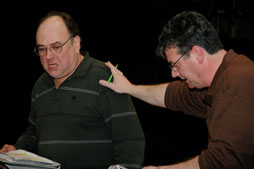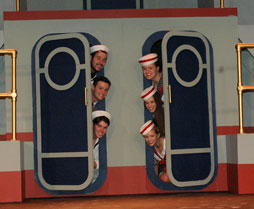By Keisha McDuffie/ne news editor

The NE stage will bring the young and mature together for its production of Rhinoceros, a play by Eugene Ionesco, next week.
Written in 1959, originally in French, Ionesco’s play, according to Wikipedia, is his response to the uprising of fascism and Nazism before and during World War ll.
But this NE production takes a look at more modern threats to society.
Director Stephen Thomas, NE associate professor of drama, adapted the original version of Rhinoceros to apply to what is going on in the world today.
The play opens in a small town square, and Thomas decided on exactly what small town.
“ This is a difficult play in two senses,” he said.
“ Typically sets are usually very sparse; in this case, we’ve chosen to set it in New Orleans. It’s quite appropriate after Katrina,” the director said.
Jean, played by NE student Trent Meyer, is a young, productive manicured gentleman meeting his half-drunk and fully apathetic friend Berenger, played by Dr. Tony Medlin of Texas Women’s University, for a drink.
Jean is disgusted by Berenger’s sloppy and unkempt appearance.
In the midst of Jean’s carrying on and blaming Berenger’s excessive drinking as the culprit of his shoddy attire, a rhinoceros charges through town.
The beast leaves all of the townspeople in a state of disbelief and shock, with the exception of an indifferent Berenger.
Professing his lack of interest in anything, Berenger says he needs alcohol to tolerate and perform everyday tasks.
After the dust settles in Act 2 from another rhinoceros stampede, this attack killing a cat, Jean notices that Berenger does indeed care about someone.
Berenger is babied by Daisy, played by TCC student Morgan Verner, a typist at his office.
Jean uses Daisy’s affection to garner reasons for Berenger to improve his life, and Berenger agrees to improve his drunken ways and vows to change. The townspeople begin debating what breed the rhinos were and attempt to rationalize these attacks, even considering accusations of conspiracy.
Ionesco uses the unexplainable “rhino episodes” as a symbol for the uprising in Nazism.
Sparknotes.com reports Ionesco’s main reasoning for writing Rhinoceros was not only to criticize the Nazis, but also to question the mentality of those who easily succumbed to Nazi beliefs. The mentality is defined as universal consciousness that subverts an individual’s free thought and will.
People get rolled up in the snowball of general opinion around them, and they start thinking what others are thinking.
Berenger calls Jean’s ideas “nonsense,” a word used repeatedly throughout Rhinoceros.
Ionesco suggests this world is nonsensical and absurd.
Thomas said, “We have to take our foolishness very serious. When you’re dealing with nonsensical language, you have to be very precise with your nonsense.”
Ultimately, the strong-willed characters fail the true test of will power when confronted with the pressure of the rhinos.
Jean becomes agitated and aggressive, claiming “humanism is dead,” and illustrates his desire for power. Jean depicted as a rhino eventually tries to attack Berenger; representing the absurdity of how the humans could allow the brutal and rapacious acts of World War II Nazism.
Berenger copes with life by believing “life is a dream” although he never determines a logical solution to the absurdity of the metamorphoses around him.
“ I’ve always been intrigued by the Theatre of the Absurd,” Thomas said. “This play is quite poignant for what’s going on in the world today.”
Performances are Wednesday, March 7-Saturday, March 10 in NFAB 1205 at 8 p.m. Tickets are free for TCC students, faculty and staff; $5 for general admission and $3 for seniors.


























